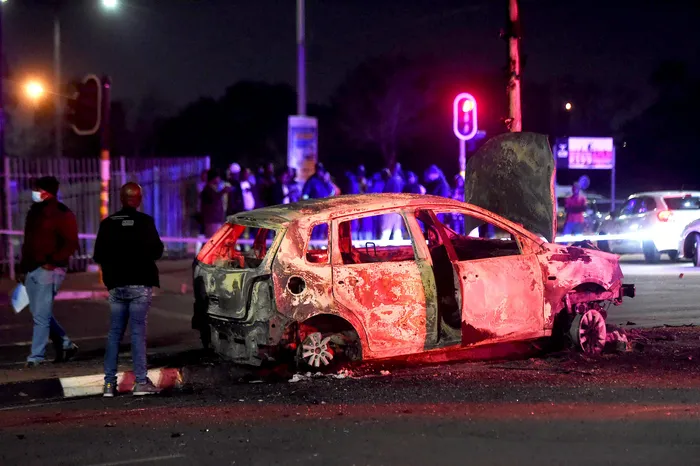
Siyanda Mthokozisi Mvelase, 27, was shot, and his body was burnt to ashes inside his e-hailing vehicle
Image: Supplied
The family of Siyanda Mthokozisi Mvelase, the 27-year-old e-hailing driver whose brutal death ignited protests at Maponya Mall in Pimville, Soweto, is now facing a heartbreaking struggle: they can’t afford to bury him.
Mvelase was shot and burned beyond recognition inside his vehicle at the mall’s entrance - the latest victim in a deadly turf war between e-hailing drivers and minibus taxi operators.
He was his mother’s only child and her world shattered the moment she heard the news. Overwhelmed by grief, Khonzi Khuzwayo was rushed to hospital as her health rapidly declined.
The family is now left with unimaginable pain and no means to give Mvelase the farewell he deserves.

Police at the crime scene where Siyanda Mthokozisi Mvelase was shot, and his body was burnt to ashes inside his e-hailing vehicle at the entrance of the Maponya Mall in Soweto.
Image: Itumeleng English/ Independent Newspapers
His maternal family, the Khuzwayos, in Nhlungwane village in KwaNongoma, northern KwaZulu-Natal, said they can't even afford to repatriate his charred remains from Gauteng. Mvelase's uncle, Mlamuli Khuzwayo, speaking to SABC News, said he was in pain over the murder of his nephew.
"What is more dreadful is that we have been told he was burnt to ashes. They only recovered his shinbone. Maybe we would have found closure if they could have at least spared his body after shooting him. Currently, we have no money for burial. We have nothing," said Khuzwayo.
The Khuzwayo family is calling for justice. One of Mvelase's aunts, Ntombenhle Khuzwayo, said two days before he was killed, he told her of his plans to build his mother a house.
Mvelase had only started his e-hailing job in Joburg two days prior to his murder, according to his aunt, Zanele Khuzwayo.
Khuzwayo said the family was heartbroken, as he had only bought his car two weeks ago.
“He was the son of my eldest sister and an only child,” she said, “He was born in 1998. After finishing matric, he moved to Johannesburg to look for work. I used to help him now and then, but he always tried to stand on his own. Eventually, he moved back home to KwaZulu-Natal.”
Mvelase returned to Johannesburg recently to pursue better opportunities, according to his aunt.
“A few months ago, he told me, ‘Auntie, I’m coming back to Joburg, and I’m going to get an Uber car,’” she recalled. “He was so excited. He finally got the car two weeks ago and started working this past Monday. Then boom, by Wednesday night – we got the news.”
Khuzwayo said the family was in shock. “He wanted to make a living and take care of his mother, who is sickly. He had so many plans, and they were all cut short.”
On Friday, calm was restored at Maponya Mall after residents blockaded minibuses from operating. Some residents accused the mall management of conniving with minibus operators who have forbidden shoppers from using e-hailing vehicles in the mall's precinct.
Both e-hailing vehicles and minibuses were back to operating without disturbances after Gauteng Transport MEC Kedibone Diale-Tlabela held a meeting with stakeholders on Thursday, urging residents to stop disrupting operations at the mall.
Gauteng police spokesperson Colonel Dimakatso Nevhuhulwi said a case of murder, two counts of attempted murder, and arson has been opened for investigation.
However, as things returned to normal at Maponya Mall, another taxi industry-related storm has been brewing in Ladysmith, northern KZN.
Teachers in the small town have been ordered by the local taxi association to stop giving lifts to pupils, or risk having their vehicles impounded, in a move that has triggered public outrage and raised questions over the legality of such threats.
A letter, stamped August 5, 2025, from the Klipriver Scholar Transport office, which operates under the supervision of the Klipriver Taxi Association, warned that from Monday, August 11, any private vehicle found carrying schoolchildren will be impounded.
The notice, written in isiZulu and signed by deputy chairperson S.E. Ngcobo and public relations officer S.P. Dlamini, read:
“Greetings. As the Klipriver Scholar Transport office, we request that you inform teachers who transport pupils from their schools to stop doing so. There are official vehicles designated for learner transport. From Monday, August 11, 2025, no private vehicle will be allowed to transport schoolchildren. If a vehicle is found carrying pupils, it will be impounded. We request your cooperation.”
However, the KwaZulu-Natal Department of Transport has warned the taxi association that their action was illegal and a violation of an agreement reached between the industry and the department.
The department's spokesperson, Ndabezinhle Sibiya, said, "It is illegal for anyone to stop cars, pull out passengers and force them to use taxis.
"In October last year, this matter came under discussion in a matter convened by the MEC and attended by Lt General Nhlanhla Mkhwanazi and the South African National Taxi Council.
"The MEC has mandated the Provincial Regulatory Entity (PRE), a very important unit in the department, to come closer to this matter working with the police."
Sibiya said the PRE was responsible for monitoring and overseeing public transport within the province, as guided by the National Land Transport Act. The taxi association's directive appears aimed at teachers who, in many cases, step in when pupils miss official scholar transport or need urgent lifts home, particularly in an area like Ladysmith that is mainly rural, where public transport is scarce.
Critics say the move could compromise pupil safety and infringes on the rights of individuals to assist children in good faith. Teachers’ unions have called for immediate intervention from the Department of Education, arguing that the association has no legal authority to impound private vehicles.
Parents in the area have voiced alarm.
“Sometimes the taxi doesn’t arrive, or it’s full. My child’s teacher has helped before. Now they’re saying they’ll take her car? This is wrong,” said one mother, who asked not to be named for fear of reprisal.
Attempts to get comment from the Klipriver Taxi Association were unsuccessful at the time of going to press.
FACT BOX
It was not the first time that the clashes between the taxi industry and e-hailing service operators have turned deadly.
In June 2017 in Sunnyside, Pretoria, an e-hailing driver burnt to death after his vehicle was torched.-In 2018, Tshwane University of Technology student Siyabonga Langelihle Ngcobo, who worked as a Taxify (rebranded to Bolt) driver was killed in a fire, trapped in his e-hailing vehicle when he was caught in the crossfire between taxi drivers and metered taxis.
In many townships, shopping centres and malls, minibus taxi operators bully the e-hailing vehicles from operating and sometimes impound their vehicles, demanding a release fee that ranges between R2000 and R10 000.
This was not limited to e-hailing vehicles, as some families that own seven-seater vehicles usually come under the abuse of minibus taxi operators who demand permits and "fine" motorists.
Past Clashes Between Taxi Associations & Other Transport Providers
Cape Town, 2023: Parents running a community lift club to take children to school in Khayelitsha reported receiving threats from local taxi operators. Some vehicles were allegedly stoned.
Eastern Cape, 2021: Teachers in Mthatha were warned against transporting pupils after school, with claims they were “taking business” from scholar transport services.
Gauteng, 2018: Several e-hailing drivers operating near school zones were chased away by taxi association members. Police later confirmed no permits were required for private school runs by parents.
KwaZulu-Natal, 2016: A church-organised shuttle for youth programmes was forced to shut down after taxi association threats.
Related Topics: